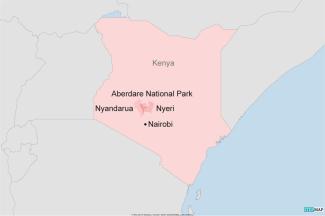Nature conservation
Protest against a road construction in Kenya
 StepMap
StepMap
The Aberdare National Park bares immense natural treasures in central Kenya, sustaining countless flora and fauna that include the Big Five – elephants, lions, rhinos, leopards and buffalos. Thousands of livelihoods are directly and indirectly reliant on the abundant resources of the Aberdare.
At the beginning of 2024, President William Ruto pledged to go ahead with the construction of the proposed 52-kilometre road through the national park to connect Nyeri and Nyandarua, two counties separated by the Aberdare. This Ihithe-Ndunyu Njeru road has been a contentious subject for the last 15 years. In 2009, conservationists went to court to oppose its construction.
The road, while touted as a game changer that will enhance trade and ties among neighbouring counties in the region, will disrupt the delicate ecosystem of the vast forest. Environmentalists do not doubt that its damage to the environment will outweigh any projected socio-economic benefits. They continue to caution the government against constructing the road.
As a home to a rich biodiversity, the Aberdare will suffer significant damage, they say. The construction will involve an upgrade to bitumen standards of the current road that leads to the park, which is largely a dirt road. Construction work will involve intensified human activity that is bound to disrupt the plants and animals caught along the route.
The environmentalists further argue that the road will increase pollution in the area, including noise, possible oil spillage and smoke, particularly by old vehicles, and dumping of plastic bottles and other waste in the park.
The government has been urged by conservationists to consider the Ndaragwa-Kariamu road as an alternative. They tout this route to be of more socio-economic benefits and to still achieve the desired goal of connecting the two counties. It passes through areas of considerable human habitation and only touches four kilometres of the forest.
Christian Lambrechts, the executive director of Rhino Ark, one of the conservation groups that have opposed the road, says: “The Aberdare’s ecosystem is one of the five key water towers of Kenya. It is also the main source of water for Nairobi city. It has a very rich population of elephants.” He adds: “We are proposing an alternative road that will be shorter, faster and which will not interfere with wildlife and the country’s water towers.”
Lambrechts says that the government’s proposed road would rise to an elevation of 3200 metres above sea level, making it the highest road in the country. He explained that the steep nature of the road would make it impractical due to slow-moving vehicles.
Joseph Maina is a freelance writer based in Naivasha, Kenya.
mainajoseph166@gmail.com


